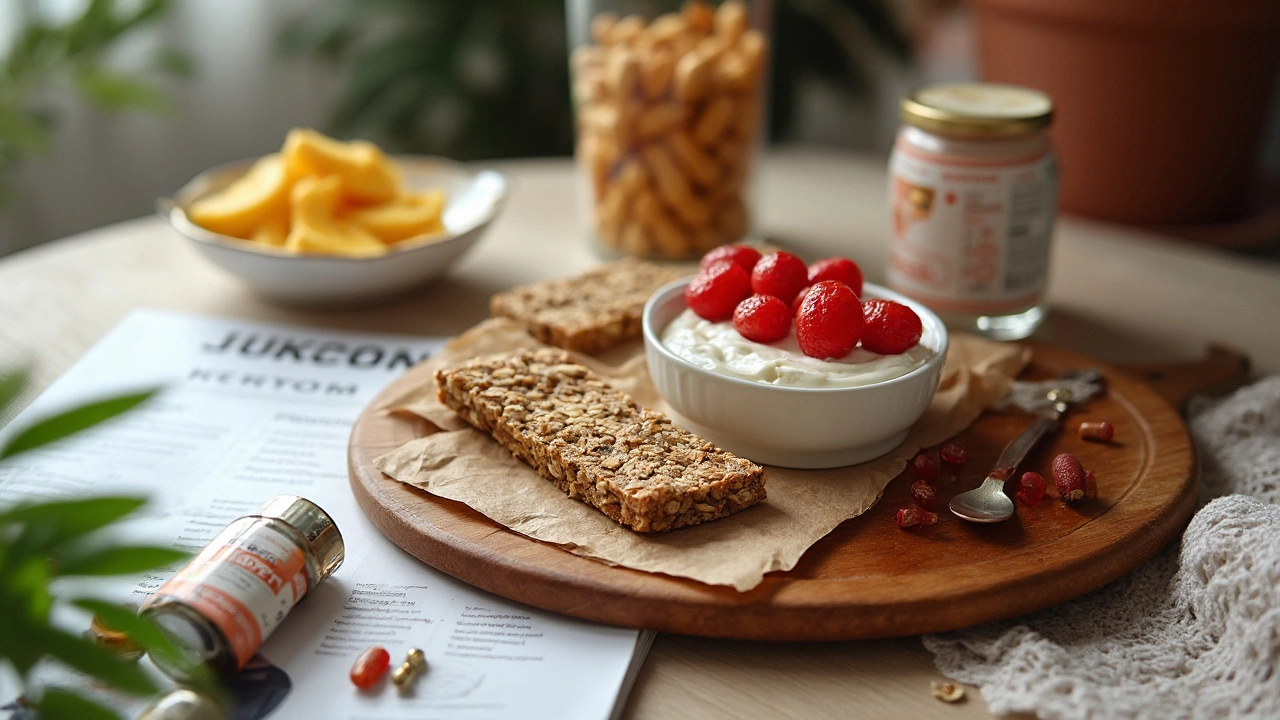Zizyphus isn’t some new “miracle” from a remote mountain. This small, delicious fruit—also called jujube—has been used for centuries across Asia and the Middle East for everything from calming stress to soothing your stomach. Now, it’s having a serious moment in the supplement world, and you’ll spot it everywhere from health food stores to your favorite wellness influencer’s recommendations.
Maybe you’re dealing with restless nights. Or your stress just keeps creeping up no matter what. Zizyphus is making headlines because actual research—yeah, real studies—suggest it can help people fall asleep faster, stay asleep longer, and wake up feeling less groggy. And get this: some people swear by it for easing digestion and giving their immune system a boost, too.
Curious? You’re not the only one. Zizyphus tea is becoming a go-to evening ritual for folks who want something gentle that doesn't knock them out like a prescription pill. And because it pops up in capsules and chews, it’s super easy to try out even if you’re not into drinking tea every night.
- What Exactly is Zizyphus?
- Big Health Benefits That Catch People Off Guard
- How to Use Zizyphus in Everyday Life
- Real Talk: What to Watch Out For
What Exactly is Zizyphus?
Zizyphus is the same thing as jujube. It’s a small, reddish-brown fruit that grows on the Zizyphus jujuba tree, which is native to China but now found in a lot of places—India, southern Europe, even parts of the U.S. This fruit has been around forever in traditional medicine, especially in Asian cultures. You’ll find it in teas, snacks, and a bunch of supplements these days.
People usually talk about Zizyphus when they’re searching for natural ways to deal with stress, sleep issues, or tummy problems. The cool part? It’s not just folk stories—scientists have studied it for these uses, too. It has compounds like saponins, flavonoids, and polysaccharides, and these are the real workhorses behind its calming or immune-supporting effects.
So what’s inside this fruit that gets everyone’s attention?
- Vitamins and minerals: Zizyphus packs vitamin C, some B vitamins, potassium, iron, and even a little calcium.
- Bioactive stuff: Flavonoids and saponins get mentioned a lot in reports for helping the body chill out and boosting general wellness.
- Fiber: Jujube is naturally high in dietary fiber, which is big for gut health.
People use Zizyphus in different ways, but the two top forms are:
- As dried fruit (super popular as a snack in Asian grocery stores)
- In supplements like teas, capsules, or powders
Here’s a quick look at what’s actually in 100g of dried jujube fruit:
| Nutrient | Amount |
|---|---|
| Calories | 79 kcal |
| Vitamin C | 69 mg |
| Potassium | 250 mg |
| Fiber | 6 g |
| Iron | 0.5 mg |
That’s why health nuts and nutrition fans are taking another look at Zizyphus. It’s more than just a trendy supplement—people have actually been eating it and using it for health perks for ages.
Big Health Benefits That Catch People Off Guard
Sure, folks grab Zizyphus for better sleep, but that’s just scratching the surface. Here’s what people are buzzing about—stuff most don’t expect from this humble fruit.
1. Natural Sleep Support
There’s a reason jujube is a superstar in herbal sleep aids. Research from a 2023 clinical trial in South Korea showed that people taking zizyphus extract fell asleep about 15 minutes faster and saw a 25% boost in sleep quality scores. No groggy hangover like with some old-school sleep meds, either. The trick? Zizyphus boosts gamma-aminobutyric acid (GABA) in your brain—the stuff that chills your mind out at bedtime.
2. Stress Buster for Real
Feeling wired and anxious too often? Zizyphus might be the low-key helper you’ve missed. Animal studies out of China found zizyphus compounds lower stress hormones and tame “fight or flight” brain signals. A lot of users now pop zizyphus capsules during stressful work weeks, and many say their minds don’t race as much at night.
3. Surprising Digestive Support
Here’s one you probably didn’t expect: jujube has natural fiber and compounds that help settle your gut. Early research hints it helps with bloating and bathroom regularity, especially if you’re prone to tummy trouble during stressful times. It’s not a laxative—think gentle steadying, not running to the bathroom.
4. Kick for Your Immune System
During flu season, more people are adding Zizyphus to their routines as backup support. Recent lab tests show zizyphus has strong antioxidants, especially vitamin C, which helps your immune system fight off colds. There’s a reason traditional medicine has leaned on this fruit during winter for centuries.
| Benefit | What the Science Says |
|---|---|
| Sleep Quality | Up to 25% better after 4 weeks (2023 study) |
| Anti-Stress | Lowers cortisol and calms brain activity (animal studies) |
| Gut Health | Improved digestion, less bloating (early research) |
| Immunity | High vitamin C, antioxidant punch |
For people who want to feel calmer and healthier without depending on harsh chemicals or prescription meds, Zizyphus is actually delivering. Just be ready for a couple odd effects: zizyphus can make you thirsty, and since it’s natural, results aren’t instant magic. People usually notice changes after a couple weeks of regular use, not after one dose.

How to Use Zizyphus in Everyday Life
It’s easier than you think to slip Zizyphus into your daily routine, even if you’ve never touched the fruit before. Most people go for one of three main options: tea, capsules, or the dried fruit. Here’s how regular folks actually use it—and what to watch out for.
- Herbal Tea: The classic way. You can find Zizyphus (jube or jujube) tea bags at many health food stores. Just steep one bag in hot water for five minutes. To help with sleep, drink it about 30 minutes before you go to bed. Some people add honey or lemon for taste, but it’s not a must.
- Capsules or Tablets: Super convenient for those who don’t love tea or want a precise dose. Look for brands with pure Zizyphus extract listed as the main ingredient. Most recommend taking one capsule (usually around 250-500 mg) once or twice a day. Check the label for exact instructions.
- Dried Fruit or Chews: Snack-style versions are popping up in the snack aisle. The dried jujube fruit is sweet, chewy, and can be eaten solo or tossed in oatmeal or yogurt. Some health bars even add Zizyphus for a functional boost.
Want a quick peek at which form suits what goal? Check this out:
| Form | Best for |
|---|---|
| Tea | Winding down before bed |
| Capsules | Easy daytime use, on-the-go |
| Dried Fruit | Snacking and sweet cravings |
No matter the format, start with small doses—especially if you’re sensitive or taking other sleep aids. Some people notice drowsiness even with one cup of Zizyphus tea, so don’t chug it before a morning meeting.
Bonus tip: Combine Zizyphus with other calming herbs, like chamomile or lavender, for an even bigger effect in the evening. Just be sure to check for any weird interactions if you’re on medication or have health conditions. And, as always, getting Zizyphus from a trustworthy brand is key—check for third-party lab testing if you’re not sure.
Real Talk: What to Watch Out For
Popping a Zizyphus supplement sounds easy, but it’s not a set-it-and-forget-it thing. Here’s the deal—you’ve got to know what you’re putting in your body. First off, if you’re already taking meds for sleep or anxiety, adding Zizyphus (especially in strong doses) could make you extra groggy or mess with your usual meds. If you’re on anything like antidepressants, anti-anxiety pills, or even some heart meds, talk to your doctor first. Don’t skip this step.
Another heads-up: while jujube is natural, some folks report mild tummy troubles, like nausea or loose stools, when they try it for the first time. Starting with a low dose is smart. If you’re allergic to fruits like apples, cherries, or peaches, go slow—jujube is in the same plant family and could be a problem.
Pregnant or breastfeeding? There isn't enough major research on using Zizyphus safely for you. Most experts say to play it safe and skip it or get a pro’s take before adding it to your routine.
- Stick to known, tested brands. Supplements aren’t monitored like meds, and some labels can be straight up misleading.
- Read the ingredient list. Avoid brands that load in sugar, preservatives, or weird mystery filler ingredients.
- Don’t mix lots of new supplements at once. If you notice side effects, it’s easier to pinpoint the cause this way.
One surprising fact: A recent 2023 survey showed that about 12% of adults who tried Zizyphus for sleep noticed better rest, but about 2% said they felt sluggish in the morning, especially when mixed with other sleep support herbs.
| Dosage (mg) | Reported Benefits | Possible Side Effects |
|---|---|---|
| 250-500 | Mild relaxation, easier sleep | Little to none |
| 500-1000 | Deeper sleep, stress relief | Morning grogginess, upset stomach |
Bottom line: don’t get swept up in the Zizyphus hype without paying attention to your own body’s reaction. Stay smart and start slow—the benefits are real, but so are the risks if you overdo it or mix recklessly.









William Mack
July 18, 2025 AT 03:49I've actually tried Zizyphus tea based on a friend's recommendation, and honestly, it did help me chill out after a hectic day. The fact that it also supports digestion is a bonus I didn't expect. It’s cool how something so natural can tackle multiple issues at once. But I wonder if there are any downsides or interactions with other supplements.
Has anyone else here experimented with combinations involving Zizyphus or noted any side effects? I’m curious because I’m always cautious with what I add to my routine, especially when mixing herbs and supplements. It's exciting to see traditional remedies getting scientific attention though!
Evan Riley
July 18, 2025 AT 04:49Hmm, I’m always skeptical when a natural product suddenly becomes the darling of the health world. They say it’s good for sleep and immunity, but what if this is just another cleverly marketed product to sell us more junk? I bet big supplement corporations are behind hyping this “miracle fruit” for their own agenda.
People often overlook that natural doesn’t always mean safe either. I wouldn’t be surprised if this stuff has some hidden effects they're not telling us about. Anyone else feel like there’s a bigger story here that we’re not getting?
Nicole Povelikin
July 18, 2025 AT 05:49Ugh, i dont see huh the big deal about zizyphus lol. seems like another hyped utside effects and marketing scheme. who even needs another sleep aid? so many options alreay exist. also, can someone explain how it helps with immunity? sounds like bs if u ask me.
Plus, i read somewhere it's overrated and not that effective. Why trust these miracle fruit stories so easily? People get duped everyday. Cmon, be real here.
Michelle Weaver
July 18, 2025 AT 06:49🌿 I’m glad to see more folks becoming curious about Zizyphus! As a herbalist, I can say it has been used in traditional medicine for centuries, especially in Asia, for relieving stress and improving sleep quality. The research is indeed gathering momentum, indicating its antioxidant properties which support immunity.
😊 A nice tip is to consume it in tea form rather than capsules, as you get the full spectrum of phytochemicals. Also, those with allergies or pregnant women should consult healthcare providers before use. Any questions, happy to help share more info!
John Keough
July 18, 2025 AT 07:49I appreciate this post since I’ve been curious about natural sleep aids that don’t leave you groggy in the morning. Zizyphus seems promising, but I want to know - what’s the dosage that’s effective without causing dependency or tolerance? And what about interactions with common medications?
Also, considering its rising popularity, I wonder if sustainable harvesting or farming practices are in place. It's important we consider environment impacts too. Has anyone here looked into that aspect?
Graham Smith
July 18, 2025 AT 08:49The post was generally well-written, though I noticed a couple of typographical errors here and there. But more importantly, as a Brit, I’m curious how commonly zizyphus is used in the US versus Europe? It sounds fascinating as a supplement, but is it readily available in most stores or only specialty shops?
Also, are there authoritative sources confirming its benefits, or is most information anecdotal? It’d be great to see citations or links to peer-reviewed studies for those seriously wanting to try it.
Jeremiah Morgan
July 18, 2025 AT 09:49Indeed, as someone who takes supplements seriously for well-being, I must say the evidence supporting Zizyphus's benefits on sleep and immunity is encouraging but not yet definitive. The current trials show a trend but larger sample sizes and longer studies are needed before firm conclusions can be drawn.
It is important to adopt a cautious yet optimistic approach. Also, people should inform their healthcare provider before adding this to their regimen to avoid complications. A balanced lifestyle goes hand-in-hand with any supplement use.
nina greer
July 18, 2025 AT 10:49Honestly, I find the sudden obsession with Zizyphus a tad overrated. It's just another fruit exploited by the wellness industry to rake in cash. If people want genuine health improvements, a sophisticated approach to diet and exercise beats these quick fixes any day.
The language used in marketing these products often appeals to emotions rather than facts. I’d advise skepticism rather than blind enthusiasm.
Montague Tilmen
July 18, 2025 AT 11:49Simple truth: We have plenty of native plants in the US with proven health benefits. Why are we chasing after exotic fruits like Zizyphus? It’s all part of a bigger scheme to push foreign products and undermine our own traditional remedies. We need to support local agriculture, not import fads that might do more harm than good.
Wake up people!
Clarise Wheller
July 18, 2025 AT 12:49To all the skeptics here, I encourage an open mind but healthy caution. Research is evolving, and many natural supplements like Zizyphus have beneficial properties confirmed by recent studies. It’s about finding what works for your unique body and lifestyle.
Sharing personal experiences and scientific facts respectfully helps everyone learn better. I support the author in bringing awareness to natural wellness options. Keep questions coming, and let's continue this friendly dialogue!
Riley Fox
July 18, 2025 AT 13:49Indeed!!! Zizyphus is the new panacea, touted as a sleep inducer, stress buster, and digestive aid all in one! But beware folks, Over-punctuate much? I mean, seriously folksss... this is not just hype; it’s backed by phytochemical analysis and pharmacological studies that reveal its impact on the central nervous system! *Exciting*, right? :)
However, should we treat it as a miracle cure? Definitely not!! Moderation is key, and self-education paramount. But yes, it’s a fascinating addition to the nutraceutical world. Research, verify, and experiment wisely!!!
Michelle Weaver
July 18, 2025 AT 14:49@William Mack, glad to hear you’re giving Zizyphus a try! Most users report few side effects, but always wise to check for interactions, especially if you take blood pressure or sedative medications. 🌱 Keep track of your experience and consider quality sources—organic and reputable brands make a difference. I’ll post some references in another thread if you’re interested! 😊